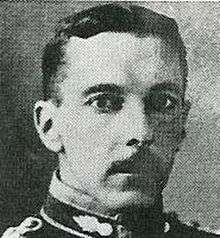Ernest Alexander
| Ernest Wright Alexander | |
|---|---|
 | |
| Born |
2 October 1870 Liverpool, England |
| Died |
25 August 1934 (aged 63) Kingsbridge, Devon, England |
| Buried at | Putney Vale Cemetery, London (51°26′26″N 0°14′22″W / 51.440624°N 0.239389°WCoordinates: 51°26′26″N 0°14′22″W / 51.440624°N 0.239389°W) |
| Allegiance |
|
| Service/branch |
|
| Years of service | 1889–1934 |
| Rank | Major General |
| Unit | Royal Artillery |
| Battles/wars | First World War |
| Awards |
Victoria Cross Companion of the Order of the Bath Companion of the Order of St Michael and St George Mentioned in Despatches Knight of the Order of Savoy (Italy) Grand Officer of the Order of Aviz (Portugal) Croix de Guerre (France) |
Major General Ernest Wright Alexander, VC, CB, CMG (2 October 1870 – 25 August 1934) was a British Army officer and an English recipient of the Victoria Cross, the highest award for gallantry in the face of the enemy that can be awarded to British and Commonwealth forces.
Alexander was trained at the Royal Military College, Sandhurst and commissioned as a into the Royal Field Artillery as a second lieutenant on 27 July 1889. He was promoted to lieutenant on 27 July 1892, and to captain on 26 December 1899.[1][2]
At the age of 43, as a major in the 119th Battery Royal Field Artillery, during the First World War, he was awarded the Victoria Cross for gallantry.

On 24 August 1914, during the action of Elouges, Belgium, when the flank guard was attacked by a German corps, Alexander handled his battery against overwhelming odds with such conspicuous success that all his guns were saved notwithstanding that they had to be withdrawn by hand by himself and volunteers led by a Captain (Francis Octavus Grenfell) of the 9th Lancers. This enabled the retirement of the 5th Division to be carried out without serious loss. Subsequently, Major Alexander rescued a wounded man under heavy fire.[3]
He later achieved the rank of major general. His medal group is on display at the Ashcroft Gallery in the Imperial War Museum, London. He has a headstone in Putney Vale Cemetery.
References
- ↑ The London Gazette: (Supplement) no. 27163. p. 909. 9 February 1900.
- ↑ The London Gazette: no. 27168. p. 1257. 23 February 1900.
- ↑ The London Gazette: (Supplement) no. 29074. p. 1699. 16 February 1915. Retrieved 29 November 2009.
- Irish Winners of the Victoria Cross (Richard Doherty & David Truesdale, 2000)
- Monuments to Courage (David Harvey, 1999)
- The Register of the Victoria Cross (This England, 1997)
- VCs of the First World War - 1914 (Gerald Gliddon, 1994)
- Liverpool VCs (James Murphy, Pen and Sword Books, 2008)
External links
- Liverpool Echo
- 'Burial location of Ernest Alexander' (S.W. London)
- 'Location of Ernest Alexander's Victoria Cross' (Sold at auction)
- Lot information from the auction